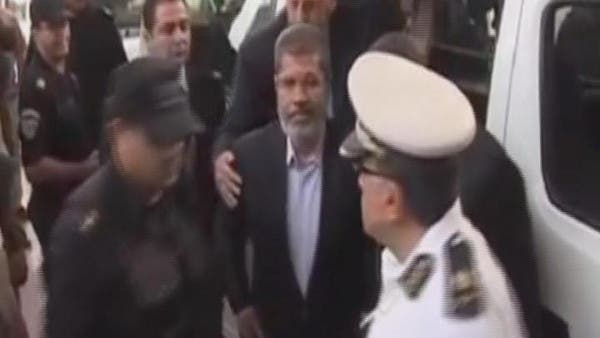Egypt’s ousted President Mursi goes on trial and challenges the court
 Egypt TV shows ousted Islamist President
Mohammed Mursi behind bars. Mursi, who was wearing a suit, said he was
Egypt’s “legitimate” leader. (Al Arabiya)
Egypt TV shows ousted Islamist President
Mohammed Mursi behind bars. Mursi, who was wearing a suit, said he was
Egypt’s “legitimate” leader. (Al Arabiya)
Al Arabiya
Ousted Egyptian President Mohammad Mursi sought to appear
“presidential” when he went on trial Monday at a makeshift court inside
the Cairo Police Academy in the east of Cairo.
The Islamist leader, who was the country’s first elected civilian president before he was removed in a military-backed uprising, refused to dress in the prison uniform and appeared wearing a suit, smiling and telling the court that he was the country’s “legitimate president.”
Unlike the trial of former President Hosni Mubarak, Mursi’s trial was not broadcast live and journalists present at the court were banned from using mobile phones and other communication technologies.
The state television aired pre-recorded clips of the trial, in which 14 other senior Muslim Brotherhood leaders were being tried for inciting violence.
The footage started with Mursi coming out from a white van, buttoning his suit jacket to be prepared to arrive in court.
Once he was in the barred cage in the courtroom, he held his hands in the air to exchange cheers with his supporters.
The Muslim Brotherhood’s leader made the Rabaa symbol with his hand, associated with the Islamist movement supporters. He asked the court to end the “travesty” that is his trial. He added that he was in the courtroom against his will.
His trial was adjourned until Jan. 8 due to chaos in the courtroom and his refusal to wear the white outfit mandatory for defendants.
“I see the judiciary as a cover for the treacherous coup,” the former president stated. “You have no right to try me because I am your president,” Mursi reportedly told the judge presiding the case, according to Egyptian TV.
He is being tried on charges of inciting the killing of protesters in clashes outside the presidential palace in December 2012.
The former president was transferred to Burj al-Arab prison in Alexandria, according to the Egyptian Television.
According to an Al Arabiya source inside the courtroom, Mursi had a conversation with Brotherhood leader Mohammad el-Beltagy and others.
Senior Brotherhood figure Essam el-Erian, who was also present, said that Egypt’s General Abdel Fattah al-Sisi, who led the military ouster of Mursi, must be brought to justice.
Defendants inside the courtroom reportedly chanted: “Down with the military rule.”
If found guilty, Mursi could face life imprisonment or the death penalty.
The interior ministry deployed about 20,000 security personnel to deal with any outbreak of violence ahead of the trial. Egypt’s armed forces have also closed off all entrances to Tahrir Square with barbed wires and stationed armored vehicles.
Security forces were also deployed across the downtown area as employees of the Mugamma, Cairo’s main administrative building in the heart of Tahrir, were asked to stay home.
However, clashes have erupted between Mursi supporters and residents in Alexandria. Two people were injured.
The Islamist leader, who was the country’s first elected civilian president before he was removed in a military-backed uprising, refused to dress in the prison uniform and appeared wearing a suit, smiling and telling the court that he was the country’s “legitimate president.”
Unlike the trial of former President Hosni Mubarak, Mursi’s trial was not broadcast live and journalists present at the court were banned from using mobile phones and other communication technologies.
The state television aired pre-recorded clips of the trial, in which 14 other senior Muslim Brotherhood leaders were being tried for inciting violence.
The footage started with Mursi coming out from a white van, buttoning his suit jacket to be prepared to arrive in court.
Once he was in the barred cage in the courtroom, he held his hands in the air to exchange cheers with his supporters.
The Muslim Brotherhood’s leader made the Rabaa symbol with his hand, associated with the Islamist movement supporters. He asked the court to end the “travesty” that is his trial. He added that he was in the courtroom against his will.
His trial was adjourned until Jan. 8 due to chaos in the courtroom and his refusal to wear the white outfit mandatory for defendants.
“I see the judiciary as a cover for the treacherous coup,” the former president stated. “You have no right to try me because I am your president,” Mursi reportedly told the judge presiding the case, according to Egyptian TV.
He is being tried on charges of inciting the killing of protesters in clashes outside the presidential palace in December 2012.
The former president was transferred to Burj al-Arab prison in Alexandria, according to the Egyptian Television.
According to an Al Arabiya source inside the courtroom, Mursi had a conversation with Brotherhood leader Mohammad el-Beltagy and others.
Senior Brotherhood figure Essam el-Erian, who was also present, said that Egypt’s General Abdel Fattah al-Sisi, who led the military ouster of Mursi, must be brought to justice.
Defendants inside the courtroom reportedly chanted: “Down with the military rule.”
If found guilty, Mursi could face life imprisonment or the death penalty.
The interior ministry deployed about 20,000 security personnel to deal with any outbreak of violence ahead of the trial. Egypt’s armed forces have also closed off all entrances to Tahrir Square with barbed wires and stationed armored vehicles.
Security forces were also deployed across the downtown area as employees of the Mugamma, Cairo’s main administrative building in the heart of Tahrir, were asked to stay home.
However, clashes have erupted between Mursi supporters and residents in Alexandria. Two people were injured.
Tags
Labels: Conflict, Egypt, Islamism, Muslim Brotherhood

<< Home